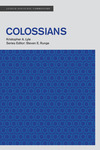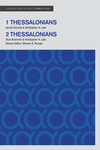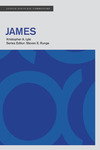Lexham Discourse Commentaries (3 vols.)
Digital Logos Edition
A New Approach to Exegesis
The Lexham Discourse Commentary series guides readers through the Greek text, integrating insights from the Lexham Discourse Greek New Testament and Discourse Grammar of the Greek New Testament. Each volume in the series shows how various discourse devices contribute to the overall flow and structure of the New Testament books by providing a unifying analysis of each text.
Dr. Steve Runge’s approach complements traditional approaches by helping readers understand the exegetical implications of the writer’s choices. The Lexham Discourse Commentaries offer sustained analysis on the text, but do not engage issues like background, setting, and audience that preoccupy traditional commentaries. Instead, Runge applies his years of research in discourse grammar to editing this running exegesis of the Greek. If you have been disappointed by the lack of discussion about structure, discourse flow, and rhetorical strategies in modern commentaries, then the Lexham Discourse Commentaries are for you.
- Provides an exegesis of the Greek text
- Analyzes the structure, discourse flow, and rhetorical strategies used by each writer
- Describes exegetical implications of the writer’s choices
- Features a basic introduction to the theoretical framework and methodology applied in the analysis
- Includes a glossary of technical terminology used in the commentaries
- Serves as a companion to the High Definition Commentary volumes
- Title: Lexham Discourse Commentaries
- Series Editor: Steven E. Runge
- Series: Lexham Discourse Commentaries
- Publisher: Lexham Press
- Publication Date: 2017
- Volumes: 3
- Pages: 440
- Resource Type: Commentaries
- Topic: Greek Grammar
- Colossians by Kristopher A. Lyle
- 1–2 Thessalonians by Jacob N. Cerone, Rick Brannan, and Kristopher A. Lyle
- James by Kristopher A. Lyle
This title is included in the following collections
You can save when you purchase this product as part of a collection.
Biblioteca Platina 2025
$999.99$699.99Biblioteca Diamante 2025
$1,499.99$1,049.99Lexham Press New Testament Com...
$1,249.99$1,249.99Biblioteca Portfólio 2025
$1,999.99$1,399.99
- $1,499.99
- $2,199.99
- $3,499.99$2,449.99
- $2,999.99
- $2,999.99
- $4,749.99
- $4,749.99
- $4,749.99
- $4,749.99
- $4,749.99
- $9,999.99
- $11,399.99
- $24,999.99

Colossians
- Author: Kristopher A. Lyle
- Publisher: Lexham Press
- Publication Date: 2017
Paul’s epistle to the Colossians is renowned for its high Christology, but how does this content fit into the broader discourse of the epistle? By paying attention to strategies of development and segmentation, Kristopher Lyle provides an explanation of how Paul’s audience would have understood his message as it unfolded. Similarly, at lower levels Lyle explains how Paul uses various cohesive devices and word order changes to build a shared mental representation and, ultimately, a coherent discourse.
Kristopher Lyle is a Language Editor at Faithlife Corporation. He holds a BA in Biblical Languages and Sociology from Houston Baptist University, and an MA in Biblical Hebrew from the University of Stellenbosch (South Africa) under the supervision of Christo van der Merwe. His research focuses on applying cognitive linguistic frameworks to our understanding of the biblical languages. He received the SASNES award for his MA thesis in 2013, and has since authored multiple articles on Biblical Hebrew lexical semantics.

1–2 Thessalonians
- Authors:
- 1 Thessalonians: Jacob N. Cerone and Kristopher A. Lyle
- 2 Thessalonians: Rick Brannan and Kristopher A. Lyle
- Publisher: Lexham Press
- Publication Date: 2017
Paul’s writing style in 1-2 Thessalonians is markedly different from that found in other letters such as Romans or 1 Corinthians. The frequent use of γάρ clauses to backfill information makes tracing the flow and development of the argument very difficult. Yet Jacob Cerone, Rick Brannan, and Kristopher Lyle are more than up to the task of guiding readers through the process of identifying and interpreting lower-level discourse features and explaining their contribution to the higher-level flow of Paul’s argument.
Jacob N. Cerone holds a BA in pastoral ministries from Moody Bible Institute and an MDiv from Southeastern Baptist Theological Seminary in Wake Forest, North Carolina. He is also completing an MTh in New Testament studies at Southeastern under the supervision of Dr. David Alan Black, the M.O. Owens Jr. Chair of New Testament Studies, for whom he also serves as a research assistant. Jacob has been ordained by the Christian and Missionary Alliance and served as assistant pastor for discipleship at Cary Alliance Church, in Apex, North Carolina.
Rick Brannan is the general editor of the Lexham English Septuagint and the translator of The Apostolic Fathers in English. He is also the author and translator of Greek Apocryphal Gospels, Fragments, and Agrapha. Rick writes a regular column on the Church Fathers for Bible Study Magazine. He is currently working on an examination of the vocabulary of the Pastoral Epistles. He recently published Lexical Commentary on the Pastoral Epistles: First Timothy is presently working on the Second Timothy volume.
Kristopher Lyle is a Language Editor at Faithlife Corporation. He holds a BA in Biblical Languages and Sociology from Houston Baptist University, and an MA in Biblical Hebrew from the University of Stellenbosch (South Africa) under the supervision of Christo van der Merwe. His research focuses on applying cognitive linguistic frameworks to our understanding of the biblical languages. He received the SASNES award for his MA thesis in 2013, and has since authored multiple articles on Biblical Hebrew lexical semantics.

James
- Author: Kristopher A. Lyle
- Publisher: Lexham Press
- Publication Date: 2017
The structure and flow of the epistle of James have been the source of much debate. This is due in part to the scarcity of structuring conjunctions that James uses as compared to the writings of Paul or Luke. In the Lexham Discourse Commentary on James, Kristopher Lyle helps readers to recognize the conventions used for signaling transitions or developments in the discourse, and also draws attention to significant features that James employs to direct the reader’s attention to important information.
Kristopher Lyle is a Language Editor at Faithlife Corporation. He holds a BA in Biblical Languages and Sociology from Houston Baptist University, and an MA in Biblical Hebrew from the University of Stellenbosch (South Africa) under the supervision of Christo van der Merwe. His research focuses on applying cognitive linguistic frameworks to our understanding of the biblical languages. He received the SASNES award for his MA thesis in 2013, and has since authored multiple articles on Biblical Hebrew lexical semantics.
Steven E. Runge holds a BA in speech communication from Western Washington University, a master of theological studies degree in biblical languages from Trinity Western Seminary in Langley, BC, Canada, and a doctor of literature degree in biblical languages from the University of Stellenbosch in South Africa, which was supervised by Christo Van der Merwe. In preparation for his doctoral research, Steve completed several years of study in the linguistic fields of pragmatics and discourse grammar.
He has served as an adjunct faculty member at Northwest Baptist Theological College, Trinity Western University, and Associated Canadian Theological Schools (ACTS) while completing his education. Steve presently serves as a scholar-in-residence at Logos Bible Software, where, along with Discourse Grammar of the Greek New Testament, he has developed the Lexham Discourse Greek New Testament and the Lexham High Definition Commentaries.
Reviews
3 ratings

SEONGJAE YEO
10/5/2019

Charles
11/14/2017

Ryan Robinson
4/20/2017
I've been waiting for these to come out for a long time. Now they are finally here. I have only worked through one section in the Colossians volume by Kris Lyle so I can't act like my review is exhaustive, but I can say, these are great resources. They go clause my clause through the original text and speak to the features and flow of though. The idea of mental representation is helpful to grasp and the author helps you catch what, in this case, Paul is doing in the discourse. I also love that there is a connection to the discourse devices in Runge's Discourse Grammar. Also, the focus is on the text and following the original authors flow of though rather than constraining it to a predetermined outline from a translation. A lot of great things to say about this. This is the theory of discourse grammar plus other things at work on a text and I love it. Thankful for these resources. I would love to see more handbooks produced. I know these took a long time to get out, but I would still plead with Faithlife or someone else to consider continuing this needed series.